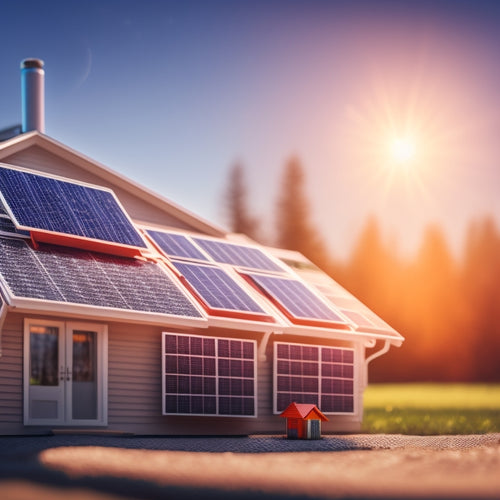
Cost for Solar System for Home
Share
You're considering a solar system for your home to greatly reduce or even eliminate your monthly energy bills. The cost of a solar system varies, but you can expect to save up to 50% on energy costs. High-efficiency solar panels, proper system sizing, and government incentives like the Federal Tax Credit can greatly reduce the upfront cost. Evaluating your energy usage and understanding peak hour consumption helps you determine the right system size for your needs. With the right investment, you can enjoy zero energy bills and increased property value. Now that you've got a sense of the basics, you're ready to explore deeper into the details that'll make your solar system a smart financial move.
The Essentials
- Investing in solar systems can eliminate or drastically reduce monthly energy bills, achieving net-zero energy bills with effective design.
- Solar systems can increase property value by up to 17%, adding $15,000 or more to the resale price, and contributing to a faster sale.
- High-efficiency solar panels maximize energy production per unit area, ideal for homes with limited roof space seeking optimal output.
- Government incentives, such as the Federal Tax Credit, allow a 26% credit on total solar system costs against federal taxes, making installations more affordable.
- Assessing daily energy consumption and peak hour usage is crucial for accurately sizing the solar system and ensuring it meets energy demands during peak periods.
Zero Energy Bills Possible
When you invest in a solar system for your home, you'll greatly reduce your energy consumption, which means you'll rely less on the grid.
By doing so, you'll eliminate or drastically reduce your monthly energy bills, saving you money in the long run.
Additionally, with a solar battery system, you can store excess energy generated during the day for use during the night or during power outages, providing backup power during emergencies Renewable Energy Solutions.
With a well-designed solar system, it's possible to achieve a net-zero energy bill, where your energy production equals your energy consumption.
Reduced Energy Consumption
By incorporating a solar system into your home, you can greatly reduce your energy consumption, potentially eliminating your energy bills altogether. This reduction in energy consumption is made possible through the adoption of energy conservation techniques and sustainable living practices. By utilizing the power of the sun, you can greatly decrease your reliance on traditional energy sources, leading to a more environmentally friendly and cost-effective solution.
| Energy Consumption | Benefits | Savings |
|---|---|---|
| Reduced energy usage | Lower energy bills | Up to 50% savings |
| Decreased carbon footprint | Environmental benefits | Reduced carbon emissions |
| Increased energy independence | Freedom from energy companies | No more rate hikes |
Eliminate Monthly Bills
As you reduce your energy consumption through sustainable living practices and energy conservation techniques, you can take the next step towards eliminating your monthly energy bills altogether.
This is where investing in a solar system for your home comes into play. By utilizing the power of the sun, you can generate enough electricity to cover your energy needs, resulting in significant solar savings.
With rooftop solar panels, you can increase your home's value and appeal solar panel installation for homes, making it a more attractive selling point should you decide to move.
By reducing your carbon footprint, you'll contribute to a cleaner, healthier environment, providing a sense of peace and responsibility that comes with embracing sustainable energy solutions.
With a solar system, you can achieve energy independence, freeing yourself from the grid and the burden of monthly energy bills.
Imagine not having to worry about rising energy costs or feeling trapped by your reliance on traditional energy sources.
Increase Property Value Significantly
You'll find that installing a solar system on your home greatly increases its value, resulting in an increased resale price.
With the rise of renewable energy, homeowners are becoming more environmentally conscious, making solar-powered homes a highly sought-after commodity.
This is because solar-powered homes are highly sought after, giving you an enhanced market appeal that sets your property apart from others.
In fact, studies have shown that solar-equipped homes sell for up to 17% more than their non-solar counterparts.
Boosted Resale Price
A solar-powered home's enhanced resale price is a significant advantage, reflecting the system's worth as a desirable amenity. You'll reap the benefits of increased property worth when you decide to sell your home.
According to various studies, a solar-powered home can increase its resale price by up to $15,000 or more, depending on the system's size and quality. This rise in resale price is a direct result of the solar incentives and home upgrades you've invested in. As a homeowner, you'll benefit from the increased property worth, which can lead to a faster sale and a higher selling price.
When you install a solar system, you're not only reducing your energy bills but also making a meaningful investment in your property.
The elevated resale price is an indication of the desirability of solar-powered homes, which are increasingly in demand. By going solar, you're not only contributing to a sustainable future but also making a smart financial move.
Your investment in a solar system will pay off in the long run, providing you with a significant return on investment when you decide to sell your home.
Enhanced Market Appeal
By the time you've installed a solar system, your home's market appeal has already received a significant enhancement. This increase is attributed to the modern, sleek design of solar panels, which not only generate clean energy but also add an attractive feature to your home's exterior.
Aesthetic considerations, such as the color and style of the panels, can be customized to complement your home's design, ensuring a seamless integration.
Moreover, going solar demonstrates your commitment to community engagement and environmental stewardship, values that connect with like-minded homebuyers. As a result, your property becomes more attractive to potential buyers who share these values.
This increased market appeal translates to a higher property value, making your home more desirable and competitive in the real estate market. With solar power, you're not only reducing your carbon footprint but also making a savvy investment in your property's future.
High-Efficiency Solar Panels Included
You'll want to understand panel efficiency when selecting high-efficiency solar panels for your home solar system. This refers to the percentage of sunlight that's converted into electrical energy, with higher efficiencies resulting in more power per unit area.
When maximizing energy savings and reducing your carbon footprint, choosing high-efficiency solar panels can make a significant difference. By selecting top-rated solar panels for residential use, you'll be able to optimize your system's overall performance and reap the benefits of renewable energy.
Panel Efficiency Explained
Within the domain of solar panel technology, efficiency plays a vital role in determining the overall performance of a solar system, and understanding this concept is essential for homeowners looking to invest in this renewable energy source.
As you investigate different solar panel types, you'll come across various efficiency ratings. These ratings indicate how well a panel can convert sunlight into electrical energy.
Efficiency ratings are expressed as a percentage, with higher ratings indicating more efficient energy conversion. For instance, a solar panel with an efficiency rating of 20% can convert 20% of the sun's energy into electricity, while the remaining 80% is lost as heat.
High-efficiency solar panels, typically above 18%, are designed to maximize energy production per unit area. They're ideal for homes with limited roof space or those seeking to optimize their energy output.
When evaluating solar panels, consider the efficiency ratings in conjunction with other factors like panel durability, warranty, and cost. By doing so, you'll be able to make an informed decision that aligns with your energy goals and budget.
Maximum Energy Harvesting
Optimizing your solar system's energy output is crucial to maximizing your return on investment, and high-efficiency solar panels play an essential role in achieving this goal. By incorporating high-efficiency solar panels into your system, you'll be able to generate more power per hour of sunlight, resulting in increased energy collection. This is particularly important if you have limited roof space or want to minimize your system's footprint.
To further maximize energy collection, consider pairing your high-efficiency solar panels with advanced solar panel technology, such as bifacial panels or split-cell panels. These innovative designs can increase energy output by up to 25%.
Additionally, integrating energy storage solutions, like batteries, into your system allows you to store excess energy generated during the day for use during the night or on cloudy days. This guarantees you're making the most of your solar system's potential, even when the sun isn't shining.
Assess Your Energy Usage
You need to determine your daily energy consumption, typically measured in kilowatt-hours (kWh), to size your solar system accurately.
Your peak hour usage, usually occurring in the afternoon when lights and appliances are in use, also plays a critical role in determining the required system capacity.
Considering renewable energy solutions and energy storage systems can also help optimize your energy usage.
Daily Energy Consumption
Across your home, various appliances and devices consume energy around the clock, contributing to your overall daily energy consumption. To determine your energy usage, you'll need to assess your daily energy consumption patterns. This involves tracking the energy usage of each appliance, lighting, and electronic device in your home. An energy audit can help you identify areas of high energy consumption and opportunities for energy efficiency improvements.
| Appliance | Daily Energy Consumption (kWh) | Hours Used Per Day |
|---|---|---|
| Refrigerator | 1.5 | 24 |
| Air Conditioner | 3.0 | 8 |
| Computer | 0.5 | 4 |
| LED Lighting | 0.2 | 8 |
Peak Hour Usage
During peak hours, typically between 7 am and 11 am, and 4 pm to 8 pm, your energy consumption surges as multiple devices and appliances operate simultaneously. This period is characterized by peak demand, where your home's energy usage reaches its highest levels.
Understanding your peak hour usage is essential in energy management, as it helps you determine the required capacity of your solar system.
You'll notice that your energy consumption patterns vary during peak hours. For instance, morning peak hours see a surge in energy usage from appliances like refrigerators, lights, and HVAC systems. In the evening, energy consumption increases with the addition of devices like TVs, computers, and kitchen appliances.
By identifying these patterns, you can optimize your energy management strategy to reduce your reliance on the grid and maximize your solar system's benefits.
Accurately evaluating your peak hour usage enables you to size your solar system correctly, ensuring it can meet your energy demands during these periods. This, in turn, helps you achieve energy independence and reduces your electricity bills.
Government Incentives Available
You'll be pleased to know that the government offers various incentives to offset the cost of installing a solar system for your home.
The most substantial one is the Federal Tax Credit, which allows you to claim a credit of 26% of the total cost of your solar system against your federal income taxes.
This credit can greatly reduce your tax liability, making your solar investment more affordable.
Federal Tax Credit
As you maneuver the cost of a solar system for your home, it's essential to factor in the federal tax credit, a notable government incentive that can help offset the upfront expense.
This federal benefit allows you to claim a tax credit of 26% of the total cost of your solar system, including installation and equipment. For example, if your solar system costs $15,000, you can claim a tax credit of $3,900. This credit can be claimed on your federal income tax return, reducing your tax liability and increasing your savings.
To qualify for the federal tax credit, your solar system must meet specific requirements, such as being installed and operational during the tax year. Additionally, you must own the solar system and have it installed on a primary or secondary residence.
The tax credit can be carried over for up to five years if you're unable to claim the full amount in the first year. By taking advantage of this federal benefit, you can greatly reduce the cost of your solar system and enjoy the freedom of generating clean, renewable energy.
Frequently Asked Questions
What Maintenance Is Required for a Home Solar System?
You'll need to perform regular solar panel cleaning to maintain energy efficiency, and inverter maintenance to verify peak performance, including checking for firmware updates and inspecting electrical connections to confirm your system runs smoothly and freely.
Can I Install Solar Panels on an Old or Damaged Roof?
Imagine your roof as a canvas, ready for a masterpiece of sustainability. You're wondering if your old or damaged roof can support solar panels. Before installing, you'll need a roof inspection to verify solar compatibility, checking for structural integrity and necessary repairs.
How Long Does a Typical Solar Panel Installation Take?
You'll typically spend 3-5 days on solar panel preparation, and the installation timeline adds another 1-3 days, depending on your roof's complexity, allowing you to capture freedom from the grid in about a week.
Are Solar Panels Affected by Weather Conditions Like Hail?
"When life gives you hail, make solar power," you might say, as you wonder if solar panels can withstand harsh weather. Rest assured, you'll find that most modern panels boast hail resistance and weather durability, withstanding impacts up to 25 mm in diameter at 23 m/s.
Can I Add More Panels to My System in the Future?
You can easily expand your solar setup in the future by adding more panels, ensuring they're compatible with your existing system, and exploring expansion options that meet your growing energy needs and panel compatibility requirements.
Final Thoughts
As you consider investing in a solar system for your home, the benefits are clear: zero energy bills, increased property value, and high-efficiency solar panels. By evaluating your energy usage and taking advantage of government incentives, you'll be well on your way to utilizing the power of the sun. And, as the saying goes, "when the going gets tough, the tough get going" - making the switch to solar will be a smart move, especially when the sun shines bright on your savings.
Related Posts
-

A Beginner's Guide to Navigating the Solar Investment Tax Credit
You're eligible to claim a significant Solar Investment Tax Credit (ITC) of 30% of total installation costs, but mane...
-

Essential Hiking Lights for Safety and Fun
When you're hitting the trails, essential hiking lights are vital for safety and fun. A lightweight headlamp offers h...
-

High-Efficiency Solar Battery Chargers for Remote Areas
High-efficiency solar battery chargers are essential for your off-grid energy needs in remote areas. They maximize en...


